
THE VOICE OF INTERNATIONAL LITHUANIA
|
VilNews has its own Google archive! Type a word in the above search box to find any article.
You can also follow us on Facebook. We have two different pages. Click to open and join.
|
News
- Posted by - (0) Comment
The Baltic warehousing and logistics property market is getting back on its feet and strongly moving forward, with the prime properties showing the lead.
After painful adjustments to the new market conditions during the crisis, which caused sharp rent rate decreases and dramatic vacancy increases (especially in the speculative and lower class W&L properties), the W&L property market experiences a robust come-back. The prime W&L vacancies in the Baltic capitals are as low as 5% in Vilnius (LT) and 10% Tallinn (EE) and Riga (LV), whereas the prime rent rate increases for top class premises are expected to be of 3-4% p.a. in Vilnius and Tallinn, and up to 10% p.a. in Riga in 2012-2013. In Vilnius, the companies which require modern W&L spaces larger than 3,000 sq. meters find it hard to lease adequate premises in prime W&L property market, unless they are willing to go for Built-to-Suit solutions or can accept the premises of lower quality/location parameters.
To illustrate the case, a strong Lithuanian developer Ogmios recently completed the third stage of the Airport Business Park - a W&L complex of over 22,000 sq.m located in front of the Vilnius International Airport. Even before the completion, the property was fully preleased, with two parts being Built-to-Suit solutions for DHL and AVON, and the third leased by Hellmann and ACE Logistics, among several other smaller tenants. The complex also includes a retail part of over 2,000 sq.m which was also preleased by Norfa, one of the largest Lithuanian retail chain operators. The developer intends to sell the Airport Business Park, with Newsec as the sell-side advisor.
About Ogmios
Ogmios Group is one of the leading real estate developers in Lithuania focusing on commercial real estate. Ogmios Group owns or manages more than 300,000 sq. metres of commercial real estate located in 5 major Lithuanian cities, worth more than EUR 200 million. Being among the top Baltic market players, Ogmios developed lasting successful relationships with many office, retail and logistic tenants, including DHL, AVON, Daewoo, ACE Logistics, Hellmann Worldwide Logistics, Systemair, VBH, Onninen, and many other.
About Newsec
Newsec is Northern Europe’s only full-service company in the property sector, with 12 offices in Lithuania, Latvia, Estonia, Finland, Sweden, Norway and Kaliningrad (Russia). Newsec offers services to property owners and companies that lease or own their properties. Newsec has about 500 employees and has recently provided advisory services in transactions with a total value of more than 9 billion euro. Annually we valuate properties worth more than 65 billion euro and manage more than 1,000 properties with a total value of more than 10 billion euro. Through our well-maintained international network of 6,000 consultants, we can offer our services in the global market. This makes us Northern Europe’s only full-service property house in the property sector, which provides the company with a unique ability to forecast the future.
The first issue of the comprehensive market analysis Newsec Property Outlook was published in 2001. Get your own copy of the latest edition at www.newsec.com/npo
Contact for more information:
Neringa Rastenyte
Head of Transactions, Baltics
+370 686 17 468
n.rastenyte@newsecbaltics.com
- Bookmark :
- Digg
- del.icio.us
- Stumbleupon
- Redit it
- Posted by - (0) Comment

Lithuanian electricity transmission system operator Litgrid has connected five wind turbines with a combined capacity of 10 MW to the electricity transmission grid in Didšiliai (Šilutė District). The total capacity of the Didšiliai wind farm will reach 21.8 MW, once the remaining wind turbines are connected to the grid by the end of the year.
“The capacity of wind farms currently connected to the electricity transmission grid totals 161.83 MW,” said CEO of Litgrid Virgilijus Poderys. “Terms for connecting more wind turbines with a capacity of 595 MW have been issued and technical projects have been harmonised. Lithuania has undertaken to integrate enough new wind turbines into the energy system before 2020 to reach a capacity of 500 MW. Given the expansion of renewable energy resources, we will be able to meet this target well before the set deadline.”
The Didšiliai wind farm is the second wind farm in the Šilutė District to be connected to the electricity transmission grid this autumn. A 39.1 MW wind farm in Čiūteliai was opened in September. As wind power developers ask to be issued with terms for connecting to the electricity transmission grid and more electricity is being generated by wind farms, efforts are being made to improve the electricity transmission grid in western Lithuania, where most of the country’s renewable energy projects are planned.
The first major wind farm with a capacity of 30 MW was connected to the grid in 2006. Lithuania currently operates 10 major wind farms, all in all 79 wind turbines are connected to the electricity transmission grid. In 2011, the wind turbines generated a total of 0.47 TWh of electricity. The country’s electricity demand was 10. 4 TWh.
- Bookmark :
- Digg
- del.icio.us
- Stumbleupon
- Redit it
- Posted by - (0) Comment
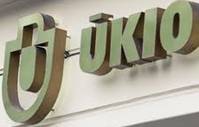
AB Ukio Bankas, the Lithuanian bank controlled by Edinburgh soccer club Heart of Midlothian Plc owner Vladimir Romanov, fell to an eight-year low on the Vilnius exchange, losing a quarter of its value in a month.
The shares fell as much as 12.4 percent today, closing down 7 percent at 0.12 euros ($0.15), the lowest since Oct. 28, 2004, according to data compiled by Bloomberg. Volume of 766,022 shares was 11 times the three-month daily average. The shares have lost 24.5 percent since Oct. 10.
The decline began after the bank reported a nine-month net loss on Oct. 29, and accelerated on Nov. 6, when it said it took over a Lithuanian sports arena developer from debtors. Swedbank changed the shares to ‘no recommendation’ from ‘buy’ on Nov. 9, citing a lack of information about the effect of the arena transaction. Romanov owns 64.9 percent of Ukio Bankas (UKB1L) shares, according to a note in the bank’s earnings report.
“Investors really question the valuation of that property developer, which is a big part of the bank’s assets, and so they don’t know how much its equity may be worth now,” Finasta investment bank analyst Tadas Povilauskas said by phone. “And if Romanov hasn’t rescued his soccer club and hasn’t increased the share capital of Ukio Bankas as was planned some time ago, it probably means he just can’t find the money.”
Read more...
- Bookmark :
- Digg
- del.icio.us
- Stumbleupon
- Redit it
- Posted by - (0) Comment

Klaipedos Nafta, which runs an oil terminal on the Baltic Sea and plans to build a liquefied natural-gas terminal, fell to an 18-month low after the Lithuanian company said it was short of working capital.
The shares fell 3.2 percent to 0.36 euros ($0.46) at 11:30 a.m. in Vilnius, the lowest since May 17, 2011, according to data compiled by Bloomberg. The volume of 26,000 shares was more than four times the three-month daily average.
Klaipedos Nafta, which is 72 percent-owned by the Lithuanian state, published two tenders for financing late on Nov. 9. The first seeks a long-term credit of as much as 73 million euros and a guarantee of $50 million, while the second seeks overdraft services in the amount of 120 million litai ($44.2 million).
Without the extra financing, the company would face a shortage of working capital as early as January 2013. Read more...
- Bookmark :
- Digg
- del.icio.us
- Stumbleupon
- Redit it
- Posted by - (0) Comment
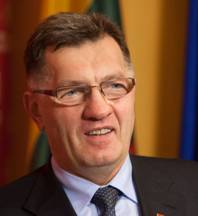
As Lithuania's prime minister,
A. Butkevičius plans first visits to Latvia and Poland
Asked to comment on President Dalia Grybauskaitė's decision not to go to Warsaw on Sunday when Poland marks the Independence Day, Butkevičius refused to comment but added that he was of the opinion that "relations with Poland need to be improved and warmed up." "It would be incorrect for me to comment on the president's decision. In the end, it’s the president's opinion and I respect that," the social democratic leader said.
"My position is that we need to improve and warm up our relations with Poland and I believe we could do a lot and reach a lot with such a neighbor as Poland which is very big and I see it as a strategic partner in implementing many common projects and as a partner in looking for agreement even at certain meetings of the Council, and we could do a lot of things by supporting each other," Butkevičius said.
It was announced on Monday that President Grybauskaitė would not attend Poland's Independence Day commemoration on Sunday. The president's spokeswoman Daiva Ulbinaitė told BNS Grybauskaitė would not attend the Sunday commemoration due to urgent internal policy-related issues.
"Due to urgent internal policy-related issues, the president will not go to Poland on 11 November. Sending her congratulation to Polish President Bronislaw Komorowski on the occasion of the Independence Day, the president invited the Polish counterpart to discuss bilateral and regional cooperation issues important for people of Lithuania and Poland at a working meeting in early December or at any time convenient for the Polish president," Ulbinaitė told BNS on Monday.
Read more...
- Bookmark :
- Digg
- del.icio.us
- Stumbleupon
- Redit it
- Posted by - (0) Comment
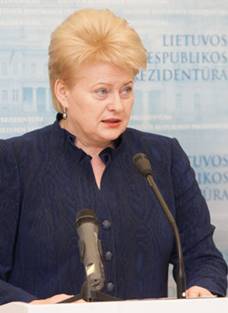
Lithuanian president goes to court over vote fraud
Lithuania's political standoff intensified Tuesday after the president vowed to turn to the nation's highest court to assess whether last month's parliamentary election should be invalidated due to allegations of widespread voting fraud.
President Dalia Grybauskaite triggered the crisis last week after she said that the Labor Party should not be part of the next government given that prosecutors and election officials have accused party leaders of buying votes.
The Labor Party, which finished third in the election, on Tuesday signed an agreement to create a center-left coalition with the Social Democrats and the populist Order and Justice. Together they would control a majority of seats in the next legislature, which will likely convene in December.
But Grybauskaite, who has the power to approve the coalition, has said she will not consider any government deal until she receives a final evaluation on the election from the Constitutional Court, according to spokeswoman Daiva Ulbinaite.
The president is expected to submit the petition to the court on Wednesday. The court must respond by Saturday.
Two Labor Party members are accused of vote-buying, while the party's Russian-born party leader, Viktor Uspaskich, is under criminal investigation for his alleged role in fraudulent party financing that dates back several years.
Read more…
- Bookmark :
- Digg
- del.icio.us
- Stumbleupon
- Redit it
- Posted by - (0) Comment

The Guardian:
This is a European suicide pact
In normal times in the EU, coordinated austerity would lower member states' debt. But instead it's making things worse
In the aftermath of the 2008 financial crisis practically all European Union countries opted for the same strategy to put their finances back on track: cut spending; increase taxes; reduce deficits. Research published by economic thinktank NIESR this week makes the first attempt (to our knowledge) to estimate the impact of this coordinated fiscal consolidation across the EU. What we have found won't make for pleasant reading in the treasuries of European governments.
In "normal times" fiscal consolidation would lead to a fall in debt-to-GDP ratios, but in the current circumstances it is likely to be self-defeating for the EU collectively. As a result of the deficit cutting plans now in train, debt ratios will be higher in 2013 in the EU as a whole, rather than lower. This will also be true in almost all the individual states (with the exception of Ireland). Coordinated austerity in a depression is self-defeating. The implication is that the strategy being pursued by individual members, as well as the EU as a whole, is making matters worse.
Read more…
- Bookmark :
- Digg
- del.icio.us
- Stumbleupon
- Redit it
- Posted by - (0) Comment

Chevron buys shale gas exploration company in Lithuania, VZ says
Chevron Corp. (CVX) bought a 50 percent stake in LL Investicijos, which owns a license for shale gas and oil exploration in Lithuania, Verslo Zinios reported, without citing anyone.
Total investment in the exploration for oil and gas in Lithuania may be as much as $250 million, the Vilnius-based newspaper said, citing Energy Minister Arvydas Sekmokas.
Read more…
- Bookmark :
- Digg
- del.icio.us
- Stumbleupon
- Redit it
- Posted by - (0) Comment
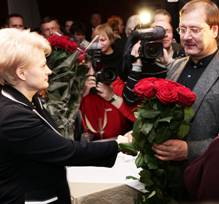
President Dalia Grybauskaite (left) openly supports the ruling coalition and has expressed doubts about the integrity of Viktor Uspaskich (right), the Russia-born Labor leader.
Lithuanians will cast ballots in the second-round of national elections Sunday in a tight race that could ultimately determine how quickly the small Baltic nation introduces the euro and whether it will build a new nuclear power plant.
Three parties across the political spectrum are hoping to emerge the winner following a close race in the first round two weeks ago. Opposition center-left parties that finished in first and second place have pledged to form a coalition that would increase social spending and postpone introducing the euro, while the ruling conservatives, who came in third, want to see Lithuania phase in the common currency in 2014 and proceed with plans to build a nuclear power plant, a plan the opposition has criticized.
The country of 3 million people saw one of Europe’s worst recessions and data show that, despite economic growth, living standards continue to decline due to soaring energy costs.
Nearly half of parliament’s 141 seats are up for grabs in Sunday’s run-off races. After the first round on Oct 14, the populist Labor Party, founded by a Russia-born millionaire, is in front with 18 seats — compared with 16 for its Social Democrat allies and 13 for its rival conservatives from Homeland Union-Lithuanian Christian Democrats.
The Labor Party and the Social Democrats, both in the current opposition, have agreed to form a coalition with another populist group, Order and Justice, which finished fifth with six seats. All three parties campaigned on higher wages and benefits and vowed to put off the euro until the European Union can resolve the three-year old economic crisis.
However, the ruling conservatives, led by Prime Minister Andrius Kubilius, could pull off an upset. The party has 35 candidates in second round ballots and leads in many of them.
If the Homeland Union were to end up with the most seats, they would likely get the nod from President Dalia Grybauskaite to form the next government, though analysts say a second-place finish might also be enough to keep Kubilius in the driver’s seat.
‘‘If Homeland Union finishes second after the run-off, this would be a major blow not only to the Labor Party but also the emerging three-party coalition. It would immediately weaken their positions in the new Parliament,’’ said Vladimiras Laucius, a political analyst at the Delfi news portal.
Read more...
- Bookmark :
- Digg
- del.icio.us
- Stumbleupon
- Redit it
- Posted by - (0) Comment

The answer lies in the two fundamental requirements for the transformation from socialist repression to a free-market capitalist economy. First, a thoughtful, transparent and unbiased privatization process is required to make the move from state-controlled socialism. Second, the rule of law must be enforced against corruption.
Russia’s transition from socialism to capitalism failed on both counts. In an ill-considered privatization process, vouchers exchangeable for shares in huge oil, mining, and other industrial companies were distributed to citizens who had no concept of private ownership. Chaos reigned as some people even traded vouchers for shots of vodka in bars; many vouchers were bought for a pittance by men who instantly became fabulously wealthy. Several Russians told us that these so-called oligarchs gained their private jets, yachts and international palaces “over the backs of the Russian people,” thus becoming symbols of capitalism’s failure.
Read more...
- Bookmark :
- Digg
- del.icio.us
- Stumbleupon
- Redit it
- Posted by - (0) Comment
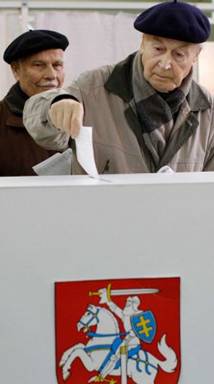
The opposition wins parliamentary elections, but intrigue remains
By Ihor SAMOKYSH, The Day, Kiev
After the first round of parliamentary elections in Lithuania that took place these days, a lot of people are wondering if the country is going to become closer to Moscow, or if it will happen the other way around. According to the preliminary results, Prime Minister Andrius Kubilius’ conservative party Homeland Union – Lithuanian Christian Democrats is only the third, with 15.02 percent of votes (13 seats). This happened despite the fact that the conservatives had fought financial crisis rather successfully, which earned them recognition and respect from the EU and IMF for “frugality and discipline.” Nevertheless, ordinary people resented Kubilius’ belt-tightening policy and were disappointed by it. Lithuanians believed the populism of the left and voted for them. According to the data provided by the Central Election Commission, the Labor Party, headed by the millionaire of Russian descent Viktor Uspaskich, got 19.87 percent of votes (17 seats), and the Social Democratic Party received 18.44 percent of votes (15 seats). A total of seven parties are going to form the new parliament.
The Vilnius-based political expert Lauras BIELINIS said in his telephone interview to The Day that the result of these elections can be viewed as positive. “All main parties, left as well as right ones, got approximately even numbers of votes. So, the Seimas (Parliament) will not be overwhelmed by one dominant political force. All important matters should be solved jointly, through mutual concessions, if needed.”
Read more...
- Bookmark :
- Digg
- del.icio.us
- Stumbleupon
- Redit it
- Posted by - (0) Comment
Uspaskikh – our man
in Lithuania
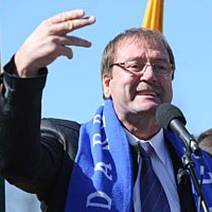
As it often happens during a crisis, the opposition won parliamentary election in Lithuania. Even though there is a run-off to be held soon, the distribution of political powers is more or less clear: the helm is returning to the leftists, says Russian political analyst Vadim Dubnov as reported in RIA Novosti.
The election leader Labour Party is planning the future coalition already; most likely it will be cooperating with the Social Democrats, who are close to them in their beliefs, reports LETA/ELTA.
Labour Party's leader Viktor Uspaskikh makes a history of our man in Lithuania, but not in the utilitarian sense which Lithuanian conspiracy followers and Russian patriots stress, believing that it was actually pro-Russian forces that won in Lithuania with the help of Uspaskikh.
Lithuania's province votes for Uspaskikh because they believe: this is why he is a millionaire – he has to share with his fellow citizens, says the Russian analyst in his article.
"Uspaskikh is a very typical story of becoming rich in a poor but cozy European country. The Social Democrats there are no longer called "ex-communists" even though, it seems that they are the last heirs of the communist party () these heirs are regular favorites of all election, including the recent one," Dubnov says.
Viktor Uspaskikh is a very Lithuanian story. And he is a very much our person in Lithuania. It is very likely that it will be him whom Lithuanian President Dalia Grybauskaite will be forced to allow forming a new government," the political analyst says in his article.
Read more...
- Bookmark :
- Digg
- del.icio.us
- Stumbleupon
- Redit it
- Posted by - (0) Comment

Instead of becoming a regional energy power-house, Lithuanians voted for big-spending politicians, rejecting plans for a new nuclear power plant
Dealing a blow to the conservative government's vision of becoming a regional energy powerhouse, Lithuanians voted instead for big-spending politicians and rejected plans for a new nuclear power plant.
The populist Labor Party, led by a Russian-born millionaire, won Sunday's election in this Baltic nation with 20 percent of the vote, while the center-left Social Democrats came in second with 18.5 percent. The two have agreed to form a new government to replace the center-right coalition, which managed just over 23 percent of the vote.
The exact composition of the next 141-seat Parliament is still not clear pending some run-off votes on Oct. 28, but Labor and the Socialists are expected to gain a majority.
Still, analysts said Monday that the two parties, which campaigned on exorbitant promises, were unlikely to make any radical policy departures, although they would likely slow down harsh fiscal measures needed to introduce the euro in 2014, one of the conservative coalition's goals.
"Promises that the new government will stop saving and start spending big-time are unrealistic," said Nerijus Maciulis, analyst at Swedbank. "Otherwise Lithuania will soon find itself in a situation similar to Greece."
Analysts at Danske Bank agreed, writing in a Monday note that "leftist parties campaigned on a relatively populist and pro-interventionist plank ...however we expect the new coalition government to tone down the rhetoric."
In 2009, Lithuania suffered a shocking double-whammy, as its economy entered a severe recession, plunging nearly 15 percent, and a Soviet-era atomic power plant was shut down, forcing the country to switch to Russian gas.
The nation of 3 million people now imports over 60 percent of its electricity needs – more than any other European Union member. Russia currently supplies 100 percent of Lithuania's natural gas at a hefty price.
Read more…
- Bookmark :
- Digg
- del.icio.us
- Stumbleupon
- Redit it
- Posted by - (0) Comment

The film that unites Lithuanians around
the globe
There have been countless instances over time where sport becomes the salve that heals the open sores of society… Jews and Palestinians joining together for soccer, warring countries meeting in cricket, Japan and in finding common ground on a baseball diamond. However somehow basketball seems to have as big, if not the biggest impact on healing political differences and overcoming boundaries than any other sport.
The 1988 Olympics saw the USSR take the gold medal from the United States, with a team dominated not of Russians but of Lithuanians. Four years later, after great turmoil that spurred a break for democracy for the country, the players banded together and faced the "US Dream Team" for basketball supremacy in Barcelona.
That story, of the players the coaches, the Americans, even the Grateful Dead, is told in the new documentary now being shown across USA, "The Other Dream Team." The stars of that team, spurred on by the crisis in the country and led by future NBA stars like Arvydas Sabonis and Sarunis Marciulionis gave the American's best a scare, but most importantly, helped unite a country torn by war and sudden poverty.
Read more…
- Bookmark :
- Digg
- del.icio.us
- Stumbleupon
- Redit it
- Posted by - (0) Comment
Lithuanian candidates to the parliamentarian election pledge nuke rethink

Sat, 13 October 2012
By Vaidotas Beniusis — Lithuania’s centre-left opposition has promised a sweeping review of the country’s energy policy if it wins tomorrow’s election, held in tandem with a referendum on building a nuclear plant. On top in the opinion polls, the Social Democrats say they oppose the current Conservative government’s plans to construct a replacement for the Baltic state’s lone atomic facility, shut down in 2009.
Despite rising global anti-nuclear sentiments following the 2011 tsunami disaster at Japan’s Fukushima plant, Lithuania has pushed ahead with plans involving neighbours Latvia and Estonia.
Read more…
- Bookmark :
- Digg
- del.icio.us
- Stumbleupon
- Redit it
- Posted by - (0) Comment
'Anti-paedophile' party poised for parliamentary debut in Lithuania
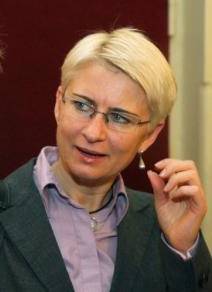
The leader of the Political Party 'The Way of Courage' Neringa Venckiene speaks during a campaign meeting in Vilnius, Lithuania. AFPpic
As Lithuania's mainstream politicians lock horns ahead of Sunday's general election, a swathe of smaller parties aim to make waves, few more so than a new anti-corruption movement spun from a scandal over an alleged cover-up of paedophilia.
While the main event in the Baltic state's vote looks likely to be the ruling centre-right's defeat by the left-wing opposition, the Way of Courage party seems set to make its parliamentary debut.
Polls it could muster 6.5 per cent of the vote, enough for a handful of seats in the European Union nation's 141-member parliament.
"Brazen corruption and injustice in this country drove me to found this party," said its creator, former judge Neringa Venckiene.
The party's name in Lithuanian, "Drasos Kelias", is a nod to her brother Drasius Kedys.
Kedys - whose first name means "the brave" - was found dead in 2010 after going missing following his alleged involvement in the 2009 fatal street shooting of another judge and Kedys' sister-in-law.
Kedys claimed that justice officials had covered up a paedophile ring abusing his daughter with the connivance of his estranged wife.
He was ruled to have died of natural causes. But Venckiene says she believes he was killed.
Read more…
- Bookmark :
- Digg
- del.icio.us
- Stumbleupon
- Redit it
VilNews e-magazine is published in Vilnius, Lithuania. Editor-in-Chief: Mr. Aage Myhre. Inquires to the editors: editor@VilNews.com.
Code of Ethics: See Section 2 – about VilNews. VilNews is not responsible for content on external links/web pages.
HOW TO ADVERTISE IN VILNEWS.
All content is copyrighted © 2011. UAB ‘VilNews’.

 Click on the buttons to open and read each of VilNews' 18 sub-sections
Click on the buttons to open and read each of VilNews' 18 sub-sections 















.jpg)



